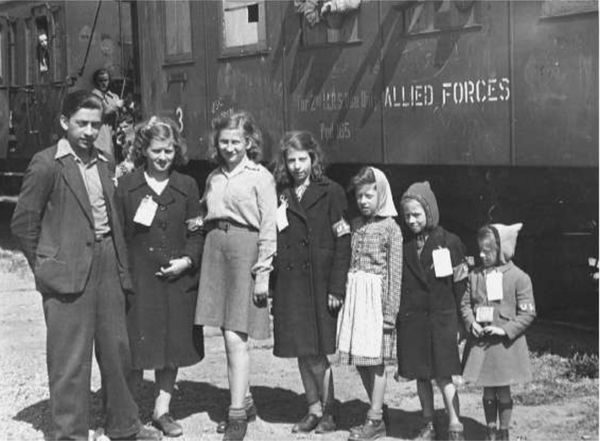 |
| The personal stories of the seven Weber siblings are shared in Beth Lane’s gripping and hopeful UnBroken |
Beth Lane, in the two intertwining strands of her gripping and hopeful documentary, UnBroken (co-written with Aaron Soffin and a highlight of the 14th edition of DOC NYC), introduces us to her mother and surviving aunts, and travels to Germany to trace the incredible journey of her ancestors. “There is no rational explanation for miracles” wrote the director’s late Uncle Alfons about his arrival, together with his six sisters in the United States from post-war Germany. They are to this day the only seven Jewish siblings known to have together survived the Holocaust.
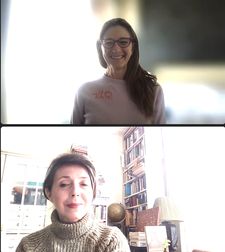 |
| Beth Lane with Anne-Katrin Titze on the Weber siblings: “Their photograph hangs in the last gallery of the United States Holocaust Memorial Museum in Washington DC.” |
In Munich, at the Süddeutsche Zeitung, journalist Hans Holzhaider calls it a “very poetic story” which unfolds slowly. There is the Catholic grandfather, Alexander Weber, who married a girl named Lina from an Hungarian Orthodox Jewish family and converted to Judaism. The Webers move to Berlin, bring up seven children in the 1930s and we hear from the aunts and the filmmaker’s mother in the present the accounts they remember.
To try and understand how all seven children managed to survive, we are taken to the Jewish Hospital in Berlin, which functioned as a collection point for deportations to the camps, to Platform 69, and eventually to the countryside and a farm in Worin, where Arthur and Paula Schmidt, now honoured among the Righteous in Yad Vashem, made it possible for them to evade capture.
The details erase the distance. Lane’s mother, Bela, the youngest, shares her memories of their mother Lina’s arrest while her daughter does her hair. Aunt Ruth, a remarkable storyteller and the one who felt most responsibility to keep them all together, remembers her arduous trip all alone on a bicycle through the wintry wartime landscape to join their father and her siblings when the Russians were close to Berlin and the war about to end.
Ultimately, UnBroken asks viewers who they want to be and reminds everyone of what should be our basic human frame of mind, namely that innocent children, no matter where, no matter who, need to be protected by all means possible.
From New York City, Beth Lane joined me on Zoom for an in-depth conversation on UnBroken.
Anne-Katrin Titze: Good Morning, Beth! You are in New York?
Beth Lane: Hi, yes, I’m in my hotel room, getting ready for our premiere tonight. Very exciting.
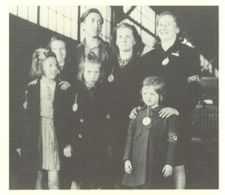 |
| The seven Weber siblings arriving in America |
AKT: Congratulations on a very powerful film! Your family is extraordinary! When did you come up with the idea that you need to be the one to make a film about them?
BL: I think every family has different members that fulfil different roles in the family. In my family I fulfilled the role at a very young age of the theatre person, somebody who was always happy to be dancing and singing and acting on stage and things like that. It was encouraged because I come from a very artistic family. My mother was a dancer and choreographer, my grandmother was a painter. My grandfather was a neurosurgeon but was very poetic and would recite poetry and would often write poems on walls and things like that.
So I think that the idea for me began at a very young age when I learned that my mom was adopted. I was six years old. She was six years old when she came to this country. At the time I was told that she had six other siblings that I would never meet. I think as a child you fantasise about things, especially the things you are told you can’t have.
AKT: And six of them, wow! This must have felt like the seven dwarves or something mysterious like that!
BL: Yes, very much so. They are the only family of seven siblings who are known to have survived together and to emigrate from Germany together. As a matter of fact, their photograph hangs in the last gallery of the United States Holocaust Memorial Museum in Washington DC. It’s part of after the displaced children and refugee area, before you see testimonial video and film of survivors. So it is a unique story, there’s no question about it. According to the Holocaust Museum they are the only family of seven who have been able to do this. I hope that there are more families like that.
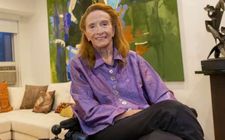 |
| Beth Lane on her mother Bela: “I come from a very artistic family. My mother was a dancer and choreographer …” |
To answer your specific question about when did I get the idea to do this - I had written about my mom’s story but my mom was so little when she came over and had very few memories. The writing was really more diary-esque for myself and self-therapeutic, trying to work through some curiosities. Like who was my mom’s mom? Who was her dad? Things like that. But then in 2017 when my mother and sister and father went back to Germany we went back to the town where my mom was hidden, to the actual farmland. The town historians had a surprise for us.
Meeting somebody who was not part of our nuclear family, who was not part of our family’s narrative, that I realised if his grandfather had been caught, he also wouldn’t be here today. And it was that kind of reverse-shot of including another family that made me realise if I don’t tell this story now, no one else in the family will do it and it will be gone forever. So I literally came back from that trip and immediately went into preproduction.
AKT: It’s interesting how you put the different layers together. On the one hand we travel together with you to Germany, on the other we get to know all these incredible aunts of yours. We hear your mother talking about the past and see you doing her hair. It is the small moments and the gigantic story. You start in Munich at the Süddeutsche Zeitung with the journalist Hans Holzhaider. Was he helpful?
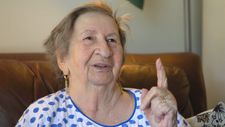 |
| Beth Lane on her Aunt Ruth who died last spring: “Her spirit is just incredible. She’s in every frame of this movie.” |
BL: Oh my gosh, was he ever! This is when you know your story is meant to be told. We were at Yad Vashem [The World Holocaust Remembrance Center]; that’s where I began my principal photography. In 2018, to have the ceremony to commend Arthur and Paula Schmidt as Righteous Among the Nations. That ceremony was exceptional. Because they are the only family of seven known to have survived and emigrated together, there are also so few German names on the walls of the Garden of the Righteous [Wall of Honor in the Garden of the Righteous Among the Nations]. At that time there were 600 names out of 27,000 names. You know Yad Vashem has been commending people to the Garden for this honour for, I want to say, over 25 years. And for there to be only 600 Germans, there was a lot of press that day.
I remember turning to the press office and asking them, do you you always have that much press? And they said, no, everybody came out because it’s a German story and there are so few Germans. So everything got printed in the German newspapers and Hans Holzhaider read this article and said, oh my gosh, this is fascinating, and he pitched the story to his editor at Süddeutsche Zeitung. And the editor did even better, he said, I don’t want you to just write about it, I want you to fly to Chicago and meet these ladies. So he did. It’s funny because at the time I was like: Mom, you can’t just let this strange journalist come! I’m the one doing this story, he’s going to scoop the story! It’s going to cannibalise my audience, what the heck!
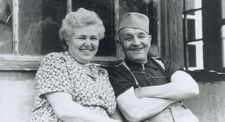 |
| Paula and Arthur Schmidt protected the Weber siblings during the war |
It turned out to be the best thing possible for the film! Because he printed his article and then somebody in the Munich, kind of Indersdorf area, read the article and turned to her girlfriend, Anna Andlauer, the historian that you meet at the end, and said, there’s this article you should read, because I read your book, Anna, and you might be talking about the same seven kids. And lo and behold, it’s how we discovered that Anna had written about our family and had no way of getting in touch with them and no idea if they were even still living. So because of Hans we met Anna and that’s how we were able to discover and film Kloster Indersdorf, the cloister where they were living for six weeks before they embarked the ship to America.
AKT: It’s fantastic how you combine the past with the present at the cloister with Sister Borromäa, who wasn’t there then but might as well have been and who is singing “Guten Abend, Gute Nacht,” the lullaby. We see the children and the ceiling and what finally led them out of the country and to America. It’s fascinating.
BL: Oh I love that you’re picking up on all of the things that make me really excited about the movie, too!
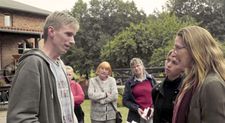 |
| Beth Lane meets with Rudolph Fehrmann III, grandson of Worin Mayor Rudi Fehrmann who did not expose the hiding of the Weber siblings at the Schmidt’s farm |
AKT: An important part are the places that are still there: The courtyard remaining in Berlin in the Scheunenviertel, to Platform 69, to the village where they were hidden. Claude Lanzmann, of course, was always looking at the present and the remains and the spirit of place years later.
BL: I mean there’s no question that Shoah is the most prolific of all the films that have ever been made about the Holocaust, at least in my opinion. For so many reasons, not the least of which is that he does not show atrocities in all nine hours. He talks about and he allows the viewers’ imagination to become the atrocity. And for me that was such an important guideline in making our film. It was such an inspiration to trust that going into those places where I knew I would not find the past nor the people from the past, not even relics.
I could look around these places and say, maybe this tree could have been there. Or the sun might have shone here and to get in touch in a very meditative way about trying to experience the souls of the past. Platform 69 in particular makes me feel that way, and the courtyard where we meet the kids. Those two experiences were very profound for me, not just as a filmmaker but as the daughter of a Holocaust survivor, as the daughter of a grandmother who rescued other people and lost her life because of it. So, yes, Lanzmann.
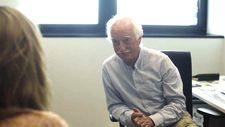 |
| Süddeutsche Zeitung, journalist Hans Holzhaider calls the Weber siblings survival together a “very poetic story” in UnBroken |
I haven’t seen Steve McQueen’s Occupied City yet but I’m excited to see his four-hour epic because I think it will probably reach into those canals of the mind in that way, just looking at present-day architecture and how does that speak to the past.
AKT: I haven’t seen it yet either. Did you see The Zone Of Interest?
BL: I haven’t seen Zone Of Interest either. I can’t wait.
AKT: It’s the best film I have seen in a long time. It’s fantastic. But back to the courtyard and the question you ask the young people there. “Would you hide me?” That was a brave question by you, I felt. I gasped that you were not just talking and explaining, but asking them directly. Did you plan to ask them or did it come spontaneously?
BL: It was an evolution. When I met the grandson of the farmers, he and I had a very profound conversation. That’s where the genesis of the question began. He had a life story that made me think, where do we get our bravery and courage? Where do we get our acts of either actively being a pacifist or actively being an activist? Both are kind of sides of the same coin. The most profound question is not "Would you hide me?" But, "Would I hide you?" When I had to explore that within myself, what would my answer be? That’s when I realised that that was the question I wanted to ask people. I think you have to walk into those conversations carefully. Talking to those kids was very special.
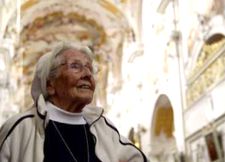 |
| Sister Borromäa sings the lullaby Guten Abend, Gute Nacht in UnBroken |
AKT: One of the stars of the film obviously is Ruth. Ruth and her story alone on the bike and also her memories of the Zarah Leander movie, the mix is incredible. How is Ruth?
BL: Well, Ruth is a blessed memory. We lost our Aunt Ruth last spring, we’re very sorry to say. Her spirit is just incredible. She’s in every frame of this movie. She was 100% supportive of making it. As a matter of fact, the first day I came to film, she opens the door and she starts talking. And I’m like, Aunt Ruth, I have to put a mike on you, hang on, save the story, we have to set up lights! Even if it’s documentary, you have nothing if you don’t have sound.
I think Ruth was so traumatised by the experience and then spent a lifetime trying to just forget it. And part of my telling the story even is given my cousins the opportunity to learn their own mother’s story. They knew bits and pieces also, but none of us heard the whole thing. So trying to get as many of the bits and pieces from the siblings who wanted to share and were alive to share - it’s been a revelation for everyone, not the least of it Ruth’s children.
AKT: The responsibility she felt throughout! She’s the one who had to keep everyone together. Twice there are links to Senta’s story. It’s remarkable that you leave it to us to put the pieces together about her depression. And the story with the Russians coming when Ruth escapes, but Senta is taken.
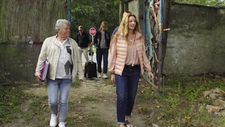 |
| Town historian Marlis Schüler with Beth Lane in Worin, Germany, where the children were saved from deportation |
BL: You know, my Aunt Senta became a very fierce and independent and wonderful wife and mother and grandmother. She never let anyone mess with her again, I tell you that. She was a singer and she spent her days harmonising with my Aunt Gertrude.
AKT: In the end credits I noticed that Udo Kier gets a thanks.
BL: Oh, I love Udo so much! We finally finished our strike. He consulted for me on our voice over for Uncle Alfons. His voice needed to be fleshed out, since I only had my uncle’s writings but not his voice. Udo was instrumental in helping me understand how it should be told. Because my uncle and I only ever spoke in English and Udo is a German speaker and was very very helpful. That’s such a fun question.
AKT: You also credit clips from Casablanca and Berlin Alexanderplatz, which I did not consciously notice.
BL: We had clips from everywhere. Our archival spreadsheet is so enormous and our research took a couple of years. In my uncle’s writings he talks about couple of seminal pieces, directing us, the family, to the research. And Berlin Alexanderplatz, that was their neighbourhood where they sold and bought produce and where they lived. So it was a natural point of reference.
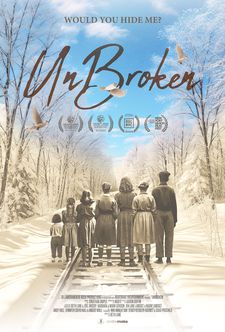 |
| UnBroken poster |
AKT: Thank you for this film. It’s a celebration of life.
BL: Thank you very much.
AKT: I also mentioned your film to Liv Ullmann, whom I talked to yesterday.
BL: Oh really? Oh wow! That’s such an honour, I have so much respect for her work! I know she has a film playing at the festival, right?
AKT: Two. There is a film about her and one she is executive producer on, that is all about nature, Norway, a family story, called Songs of Earth. You may be interested in those. She and Wim Wenders are executive producers on the second one.
BL: That makes sense. I will definitely look into that. Of course I want to see the one that’s about her as well.
AKT: You learn so much and she’s such a wonderful person. I loved talking to her, she’s so open.
BL: Thank you for talking to me and taking an interest in the film! All the profits from the sale of the film will go to The Weber Family Arts Foundation to combat antisemitism, bigotry and hate through the arts by telling stories of hope.
AKT: It’s very important at the moment to speak about that! Thank you!
BL: Thank you so much.
UnBroken will be available online through Sunday, November 26.





















